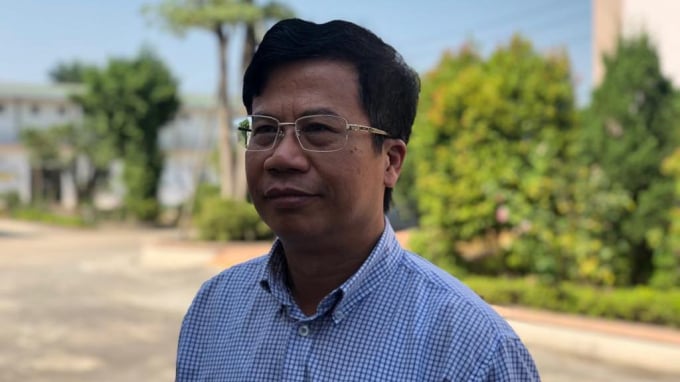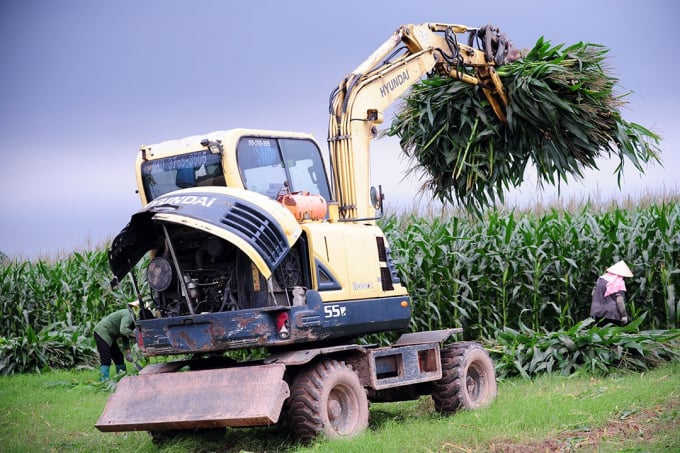May 21, 2025 | 04:58 GMT +7
May 21, 2025 | 04:58 GMT +7
Hotline: 0913.378.918
May 21, 2025 | 04:58 GMT +7
Hotline: 0913.378.918

Mr. Tong Xuan Chinh, Deputy Director of the Department of Livestock Production. Photo: DV.
Deputy Director Tong Xuan Chinh of the Department of Livestock Production under MARD said that it is completely an objective condition when the prices of animal feed for swine and poultry are increasingly surging to new heights.
Because over 90% of materials serving for animal feed production industry in Vietnam are depending on imports, mainly corn, drying properties of soybean oil, fish powder, DCP among others. No sooner than the first six months of 2020, had Vietnam imported over 10 million tons of raw materials for the production of livestock and aqua feeds of all kinds.
Thereby, for the feeding products produced from grain food-stuffs for pigs and poultry, Chinh affirmed that Vietnam needs to accept the common produce of global market prices as well as the impacts of Covid-19 pandemic on logistics activities.
As mentioned by the Department’s leader, it is unpromising to self-control the materials of animal feed production for pigs and poultry in long-term as Vietnam has no strength compared to corn and soybean producing countries.
It is proved that the yield of Vietnam’s corns just around reaches 5-6 tons per ha while that of the US is nearly 10 tons per ha, which are all harvested by machine and stored in a cold silo so that Vietnam’s corns have no chance to compete in terms of prices and quality. Similarly, Vietnam's annual soybean production is not enough to meet the demand for tofu.
For rice products, recent studies show that most of Vietnam's rice varieties do not meet the nutritional criteria for animal feed. Currently, only rice bran and cassava (noodles) can be used to produce the feedings, but with very limited processing technology, cassava chips are still mainly exported to China.

Promoting the development of grazing cattle to take advantage of green forage and raw forage is an important development direction of the livestock industry in the coming period to reduce dependence on imported raw materials. Photo: TL.
Thereby, under the Strategy of livestock production development and the scheme on development of the animal feed processing industry in the 2021-2030 period, the Department of Livestock Production determined that it is necessary to focus on promoting secondary processing stages and technologies for products in the horticulture and aquaculture industries to produce feed products with domestic strengths.
According to statistics, Vietnam has over 120 million tons of agricultural by-products or residues of which 30 million tons are used for biological buffers while the remaining 90 million tons can be used as animal feed (40/90 million tons is straw used as feed for ruminants).
“Today, South Korea develops a technology of post-harvest handling of straws right in the rice harvest, followed by spraying with biological products, then packing, silage as food for ruminant animals, and preserved for up to 2 years. This is an important development direction that Vietnam's livestock industry needs to move towards in the coming period," emphasized Deputy Director of the Department of Livestock Production Tong Xuan Chinh.
While Vietnam spends billions of dollars to import materials to produce industrial animal feed in 2020, domestic enterprises started to export their green raw animal feed to the world.
Specifically, Vietnam currently has 39 exporters of forage, including biomass corn silage, grass silage, straw silage, gamma-ray feed, bio-buffer,... with an output of 225,000 tons, worth $22.3 million.

(VAN) Khanh Hoa is investing over 545 billion VND to develop 240 hectares of high-tech marine aquaculture in order to guarantee a consistent supply of seafood exports and achieve the USD 1 billion target.

(VAN) Minister of Agriculture and Environment Do Duc Duy held a meeting with Soopakij Chearavanont, Chairman of C.P. Group, on May 15.
/2025/05/16/3800-0-nongnghiep-143756.jpg)
(VAN) Suntory PepsiCo Vietnam coordinated with the Ministry of Education and Training to implement an education program on water conservation, reaching nearly 1 million primary school students nationwide.

(VAN) Vietnam’s TH Group officially put its high-tech fresh milk processing plant into operation in the Russian Federation, marking a historic moment as the first TH true MILK cartons were produced in Russia.

(VAN) Use of high-quality broodstock and biotechnology is regarded as the most effective approach to ensuring sustainable and economically viable shrimp aquaculture ahead of climate change and the emergence of increasingly intricate disease patterns.

(VAN) Carbon farming is a form of agricultural practices that helps absorb more greenhouse gases than it emits, through smart management of soil, crops, and livestock.

(VAN) This is a key content of the Memorandum of Understanding recently signed between the Vietnam Fisheries Society and Kunihiro Inc of Japan.